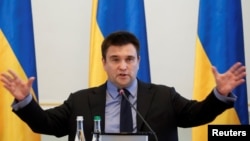Ukraine's foreign minister asked the European Union on Monday for hundreds of millions of euros in loans and aid for infrastructure and businesses in its troubled east and south, regions he said Russia was trying to "suffocate."
EU foreign ministers were discussing increasing support for Ukraine, which holds a presidential election next month in tough conditions. Russia annexed its Crimea peninsula in 2014 and backs armed separatists in its eastern industrial Donbas region.
The EU is also moving to put more Russians under sanctions over Moscow's standoff with Kiev in the Azov Sea, to the southeast of Ukraine.
"We need targeted... support for the Ukrainian south, to work with us on infrastructure... Further Russian attempts to destabilize Ukraine's south would be very detrimental for European security," Foreign Minister Pavlo Klimkin told reporters in Brussels.
"[There is] an attempt to suffocate the whole Ukrainian Donbas... We need infrastructure, it's about roads and railways. And to support people... help them to launch new small and medium businesses because we need to fundamentally reshuffle the whole economic model there," he added.
President Petro Poroshenko, elected amid high hopes for change in Ukraine after street protests ousted his pro-Russian predecessor in 2014, is in an uphill battle for re-election after his popularity plunged over graft and sliding living standards.
Klimkin accused Russia of turning the Donbas region – which remains outside the control of the Kiev government - into a "big [money] laundering machine". He also said Kiev could "under no circumstances" allow Russians to be part of an OSCE election monitoring mission.
The EU's top diplomat, Federica Mogherini, who chaired Monday's ministerial meeting, stressed the bloc's "unwavering support for Ukraine's territorial integrity and sovereignty" but also urged Kiev to press on with economic and political reforms.
Despite Western pressure, Moscow has vowed never to return Crimea to Ukraine. A peace plan for eastern Ukraine, sponsored by Germany and France, has helped put an end to heavy fighting there but has since largely stalled.
Relations between the EU and Russia plunged to fresh lows last year over the poisoning of a former Russian double agent in Britain. But the EU is divided over how hard to punish Moscow - or how far to support Kiev - as some would prefer to prioritize business ties with Russia.





